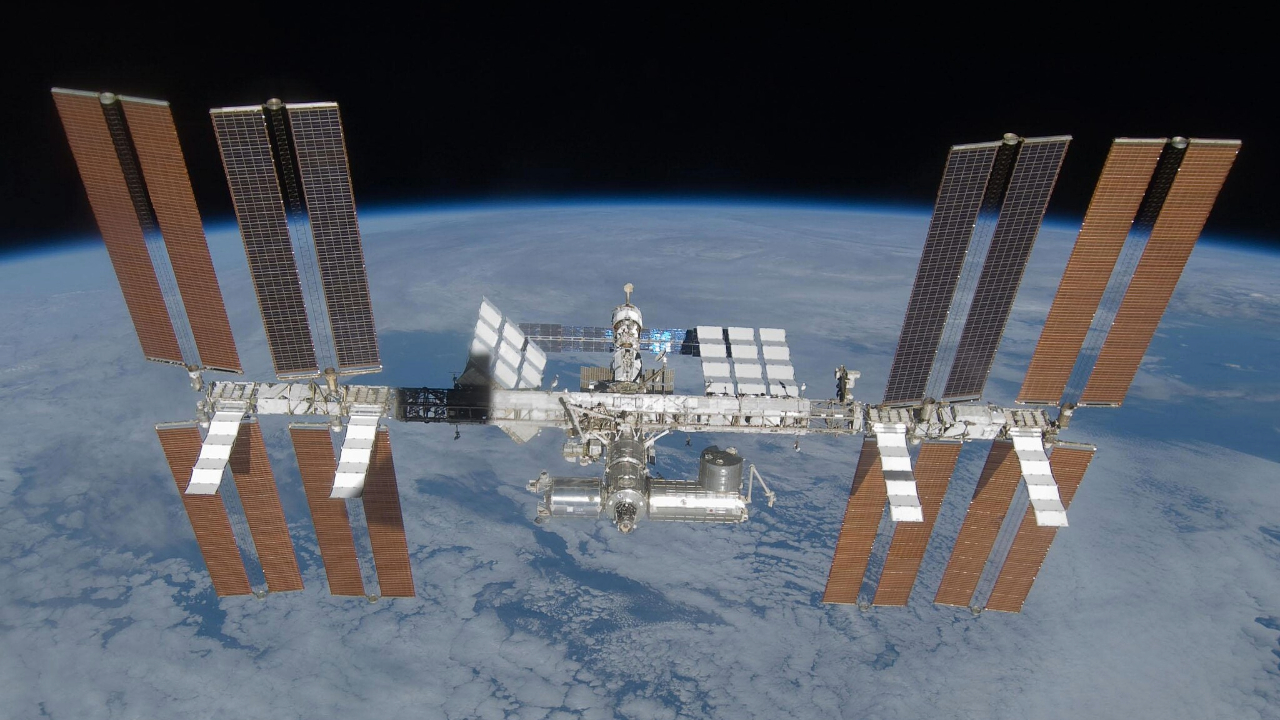UAE's 1st long-duration astronaut marks the start of Ramadan in space
Sultan Al Neyadi, who flew to space March 2 as part of the SpaceX Crew-6 mission, may not fast on the International Space Station under an exception for travelers.

Breaking space news, the latest updates on rocket launches, skywatching events and more!
You are now subscribed
Your newsletter sign-up was successful
Want to add more newsletters?
The first Emirati astronaut in space is celebrating the beginning of Ramadan in orbit with the arrival of the new moon this week.
Astronaut Sultan Al Neyadi arrived in space on March 2 after launching into orbit aboard a SpaceX's Falcon 9 rocket in a Crew Dragon spacecraft. He is working aboard the International Space Station for the next half-year on the first-ever long duration mission flown by a United Arab Emirates (UAE) astronaut.
"Ramadan Mubarak. Wishing you all a month filled with blessings," Al Neyadi wrote on Twitter Thursday (March 24) while sharing a video of his spectacular views for the Earth, moon and Venus from the International Space Station. "Sharing the beautiful night time scenery from the International Space Station Station with you all."
مبارك عليكم الشهر 🌙اسأل الله ان يهل علينا شهر رمضان بالخير والبركة على الجميع..اهديكم هذه المشاهد الليلية الجميلة من محطة الفضاء الدولية.Ramadan Mubarak 🌙 Wishing you all a month filled with blessingsSharing the beautiful night time scenery from the International Space… pic.twitter.com/oF3557vXtmMarch 23, 2023
Ramadan is the ninth month of the Islamic calendar and in 2023 will last from roughly March 22 to April 23, depending on local sightings of the crescent moon. The Islamic calendar follows the moon, meaning that the dates change yearly in relation to the Gregorian calendar that most of the world uses.
While most adult Muslims must fast from dawn to sunset as one of the five Pillars of Islam, Al Neyadi may not participate for operational reasons.
Related: SpaceX Crew-6 astronaut mission: Live updates
"We're actually allowed to eat sufficient food and to prevent any escalation of lack of food or nutrition or hydration," Al Neyadi said of Muslim travelers during a pre-flight press conference on Jan. 25.
Breaking space news, the latest updates on rocket launches, skywatching events and more!
He added that his priority will be serving the mission, as he cannot do activities "that can jeopardize the mission or maybe put the crewmember in a risk."
Al Neyadi is not the first astronaut to mark Ramadan in space; the first-ever Muslim to go to space, Prince Sultan bin Salman Al-Saud of Saudi Arabia, arrived towards the end of the holy month on June 17, 1985, on the weeklong space shuttle mission STS-51G.
The Emirati astronaut is scheduled to perform 19 dedicated experiments on topics like back pain, plant biology, cardiovascular health, material science, radiation, sleep, and fluids, according to an overview provided by the Mohammad Bin Rashid Space Centre that manages the UAE astronaut program. Two outreach experiments with students are also planned to look at dental or oral cells in space, along with blood flow.
In his first press conference from space on March 6, Al Neyadi said he is still adjusting to floating around in space, but enjoying the process. "I'm still coping, I'm still learning, but hopefully I will enhance my skills in the coming days."
Elizabeth Howell is the co-author of "Why Am I Taller?" (ECW Press, 2022; with Canadian astronaut Dave Williams), a book about space medicine. Follow her on Twitter @howellspace. Follow us on Twitter @Spacedotcom or Facebook.

Elizabeth Howell (she/her), Ph.D., was a staff writer in the spaceflight channel between 2022 and 2024 specializing in Canadian space news. She was contributing writer for Space.com for 10 years from 2012 to 2024. Elizabeth's reporting includes multiple exclusives with the White House, leading world coverage about a lost-and-found space tomato on the International Space Station, witnessing five human spaceflight launches on two continents, flying parabolic, working inside a spacesuit, and participating in a simulated Mars mission. Her latest book, "Why Am I Taller?" (ECW Press, 2022) is co-written with astronaut Dave Williams.
